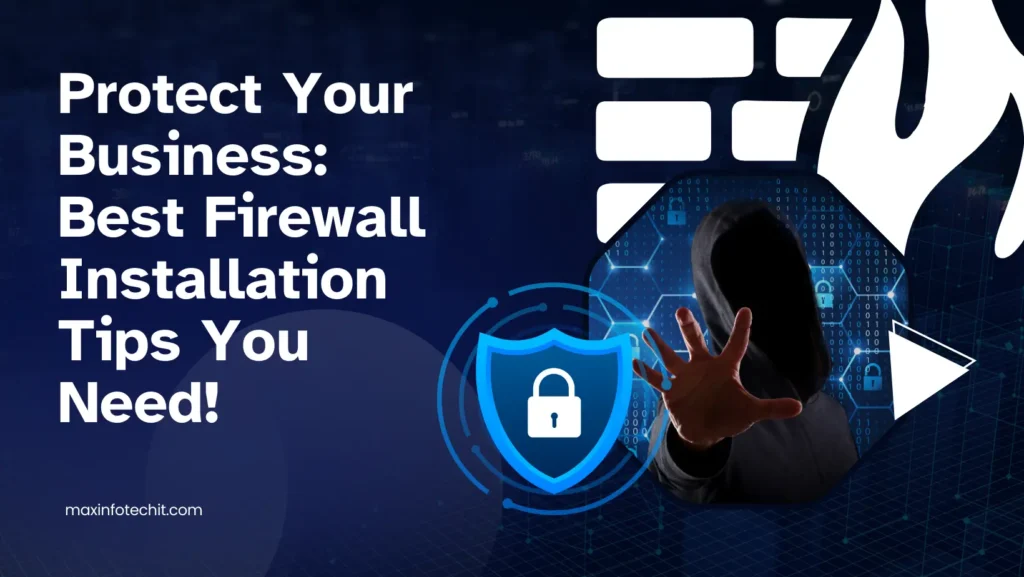Protect Your Business: Best Firewall Installation Tips You Need!

Imagine your home with no doors or locks. Scary, right? Anyone could walk in uninvited. The same applies to your network. Without proper protection, cybercriminals can easily breach your system, steal data, and cause chaos. This is where a firewall steps in.
A firewall is your digital security guard. It monitors incoming and outgoing traffic, blocking anything suspicious while allowing safe communication. Whether for businesses or personal use, installing the best firewall installation is crucial for safeguarding sensitive data and ensuring cyber resilience.
How Do Firewalls Work?
Firewalls act as a barrier between a trusted internal network and untrusted external sources (like the internet). They use predefined security rules to filter traffic and protect against cyber threats. Here’s how they function:
Packet Filtering: Analyzes small data packets and determines whether they should pass through based on security rules.
Stateful Inspection: Monitors active connections and ensures that incoming packets correspond to a known outgoing request.
Proxy Service: Acts as an intermediary between users and the web, preventing direct access to harmful sources.
Next-Generation Firewalls (NGFWs): Combines traditional firewall technology with advanced features like deep packet inspection and intrusion prevention.
With cyber threats evolving daily, having the best firewall installation in place is a must!
Types of Firewalls
Understanding different firewall types can help you choose the best fit for your needs:
Hardware Firewalls – Physical devices placed between the network and external sources to filter traffic.
Software Firewalls – Installed on individual devices to provide security for specific applications or networks.
Cloud-Based Firewalls – Hosted in the cloud, offering scalable protection without the need for on-premise hardware.
Next-Generation Firewalls (NGFWs) – Advanced firewalls that include features like deep packet inspection and application control.
Proxy Firewalls – Serves as an intermediary for web requests, filtering malicious content before it reaches your network.
Choosing the best firewall installation ensures your system stays protected against evolving threats.
Advantages of Installing a Firewall
A properly installed firewall is a game-changer in cybersecurity. Here’s why:
Blocks Unauthorized Access – Prevents hackers from infiltrating your network.
Prevents Malware Attacks – Filters out malicious traffic before it can harm your system.
Enhances Privacy – Keeps sensitive information safe from prying eyes.
Controls Bandwidth Usage – Regulates internet access and prioritizes essential services.
Monitors Network Traffic – Provides detailed logs for analyzing security threats.
Compliance with Regulations – Meets industry security standards to avoid legal issues.
With the right best firewall installation, you can safeguard your business from costly cyberattacks.
Firewall Installation Best Practices
To maximize security, follow these expert-recommended firewall installation best practices:
1. Choose the Right Firewall
Select a firewall that aligns with your business size and security needs. An NGFW is recommended for businesses handling sensitive data.
2. Segment Your Network
Divide your network into smaller sections, limiting access to critical areas. This reduces the risk of a total system compromise.
3. Regularly Update Firewall Firmware
Cybercriminals exploit outdated security systems. Keep your firewall updated to patch vulnerabilities and enhance protection.
4. Enable Intrusion Prevention System (IPS)
An IPS adds an extra layer of security by detecting and blocking threats in real-time.
5. Monitor and Analyze Logs
Regularly review firewall logs to identify suspicious activities and take corrective actions.
6. Use Multi-Layered Security
Firewalls alone aren’t enough. Combine them with antivirus, endpoint protection, and strong passwords for complete security.
7. Restrict Access Based on Need
Apply the principle of least privilege—granting access only to those who truly need it.
8. Test Your Firewall Configuration
Run penetration tests to ensure your firewall setup is foolproof.
9. Educate Your Team
Train employees on cybersecurity best practices to prevent human-related security breaches.
10. Seek Professional Assistance
If you’re unsure about the setup, consulting with experts ensures the best firewall installation for your organization.
A firewall is your first line of defense against cyber threats, but a poorly installed one is like a broken lock on your front door. By following the best practices outlined above, you can ensure the best firewall installation that keeps your network safe and secure.
At Maxinfotech, we specialize in providing cutting-edge firewall solutions tailored to your needs. Protect your business today—contact us for expert guidance on securing your digital assets!
